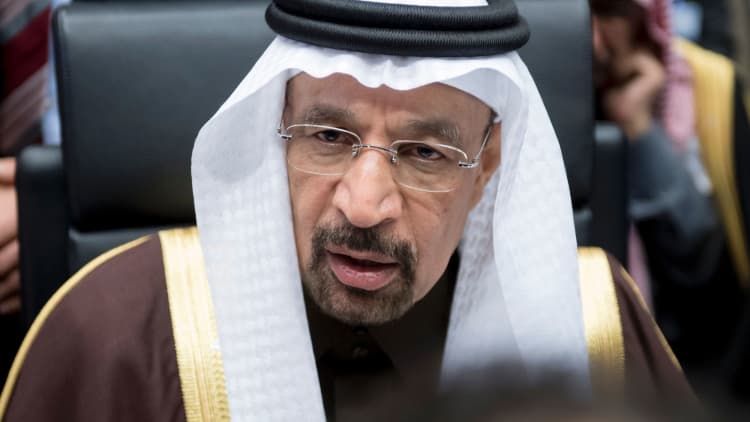
Oil is down again today on concerns Saudi Arabia may be throwing in the towel on cutting its oil output. It's the latest in a string of headaches for big oil.
Saudi Arabia indicated to OPEC its production had increased to 10.011 million barrels per day in February. The markets immediately took this to mean that the Saudis had reversed some of the cuts it had made the previous month.
But in statements issued in the middle of the day, the Saudis reiterated that they were "committed and determined to stabilizing the global oil market."
And that production increase? They insist Saudi crude supply was little changed and in-line with OPEC output cuts. The source of the confusion, the Saudi energy minister said, was "The difference between what the market observes as production, and the actual supply levels in any given month, is due to operational factors that are influenced by storage adjustments and other month to month variables."
If this sounds like a bit of official gobbledygook to you, the market has initially taken it that way as well.
Oil was little changed after this announcement, so the market clearly believes that there are cracks in the Saudi commitment to the production cut deal.
This is adding to the "oversupply trade" that is now taken over as the dominant motif in the energy trade, replacing the "reflation trade" that has dominated for several months.
The result? Crude down another 2.3% to the lowest level since November 30th. Does that date sound familiar?
That was the day OPEC announced the production cuts!
The list of crude troubles is getting longer:
1) High U.S. inventory trends
2) High U.S. rig count
3) Record speculative longs in oil
4) E&P capital spending growth
5) A potential Fed rate hike that takes the dollar higher, hurting oil
Put it all together and it means that a lot of complaceny is getting flushed out of the oil trade in the last few weeks, along with a lot of expectations for higher 2017 earnings in Big Oil:
Energy this month
Crude oil down 12.4 percent
Big Energy (XLE) down 3.4 percent
Oil & Gas E&P (XOP) down 6.3 percent
Oil Services (OIH) down 7.3 percent
These are on top of earlier declines that began in January.
As usual, ExxonMobil is the poster child for a lot of these issues. It hit a 52-week low last week. Earnings are expected to increase 60% this year, revenues 30%, much of it predicated on higher oil.
How much higher? Certainly closer to $60, and not $47 where it is now.
Big Oil has two other notable problems independent of the price of oil: 1) continuing low natural gas prices, and 2) increasing difficulty in growing oil production.
Morningstar highlighted the production problem in a note to clients this morning: "With rising resource nationalism, Exxon has found it increasingly difficult to increase production and book reserves. As a result, it's more reliant on higher-cost projects than in the past."
It's not all bad news. Exxon's dividend — now with a 3.7% yield — still appears safe for the moment.
There's one final point: the Saudis may have some motivation for letting go of the production deal. It may have to do with a very important elephant in the room: Aramco. The Saudis certainly are willing to sacrifice market share by cutting production, PROVIDING it will prop up oil prices and lead to a higher valuation for Aramco, which is scheduled to go public next year.
But look what's happening: the Saudis are sacrificing by cutting production, and oil prices are STILL going down.
This is crushing the Saudis' expectations. The Saudis have been saying that Aramaco could be worth north of $2 trillion, but there have been reports for weeks that it could be worth $1.0 to $1.5 trillion.
Yikes! Imagine being the Saudis: "We've sacrificed market share to others, oil is still going down, and now the valuation on Aramaco may not be worth anywhere near what we thought it would be!'
Seen in this light, it would make perfect sense if the Saudis started to question the wisdom of continuing with production cuts.


